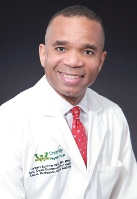
Three representatives of the Wayne State University School of Medicine will be among the academic medicine thought leaders who will present at Learn, Serve, Lead 2016, the annual meeting of the Association of American Medical Colleges taking place in Seattle next week.
Herbert Smitherman Jr., M.D., M.P.H., F.A.C.P., vice dean for Diversity and Community Affairs, will join the two secretariats of the Liaison Committee for Medical Education to present "LCME Accreditation: A Tool for Improvement." The presentation, scheduled for 1:45 p.m. Nov. 12, will focus on how medical education programs can use accreditation as a tool to implement a continuous quality improvement plan and how schools can use the LCME standards and elements to foster culture change and quality improvement.
The annual AAMC meeting attracts a veritable who's who of those in academic medicine, and offers presenters and their medical schools a chance to shine.
Dr. Smitherman, largely responsible for turning around the School of Medicine's decrease in minority medical students in less than a year, will talk about that experience and the changes implemented to create that success. His panel mates include Barbara Barzansky, Ph.D., LCME co-secretary and director of the Division of Undergraduate Medical Education for the American Medical Association; Veronica Catanese, M.D., LCME co-secretary and senior director of Accreditation Services for the AAMC; and M. Lourdes Winberry, M.P.H., associate dean for Health Affairs for the George Washington University School of Medicine and Health Sciences.
The LCME, in 2015, cited the School of Medicine for a number of concerns, but chief among them was the lack of diversity in the student body.
Once a national leader in accepting and graduating underrepresented minorities in medicine (identified as African-American students, Hispanic/Latino students, American Indian students and socio-economically disadvantaged students), the School of Medicine accepted only three such students, or 2.5 percent of that year's class, in 2014. In 2015, that number climbed to 15 students. The class that began this year contained 65 students underrepresented in medicine, or 23 percent of the newest class, with no sacrifice in grade-point averages or MCAT scores.
The dramatic turnaround was the result of a number of practices, including more aggressive campaigning and recruiting, and a shift to a holistic admissions and interviewing process.
The findings by the LCME during the reaccreditation process, Dr. Smitherman said, were a "disguised blessing."
"The LCME action was the impetus to change," he said. "Without it, the School of Medicine would not have been able to do what needed to be done, which included a change in leadership and a commitment of resources to rectify the situation."
Tsveti Markova, M.D., chair of the Department of Family Medicine and Public Health Sciences, is one of three speakers who will present "Emerging Solutions: Academic Career Opportunities in the Rapidly Changing World of GME" at 10:30 a.m. Nov. 12.
"The landscape of medical education, particularly in Graduate Medical Education, is changing due to multiple external forces, like new accreditation requirements, implementation of the Affordable Care Act, electronic records keeping, emphasis on teamwork, and quality and patient safety, amongst others," said Dr. Markova, who also serves as associate dean for Graduate Medical Education. "The expectations for a modern medical curriculum are reflective of this change. With colleagues from other institutions on the panel, we will introduce a community-based faculty development model to enable identification of resources and networks to foster career development."
Doug Skrzyniarz, the School of Medicine's associate vice president of Government Affairs, will present "Activism in Academic Medicine: Re-Imagining Medical Education for Collective Action" with four other speakers at 1:45 p.m. Nov. 12. He will speak about student activism and leadership.
"I will be sharing the success of the School of Medicine's LEAD (Leadership and External Affairs Development) program, which helps students better understand how best to communicate with legislators, how the health policy system works and to begin their leadership development journey," Skrzyniarz said. "As future physicians, it is important for medical students to understand the intersection between policy and the practice of medicine. Whether they want to or not, they will be looked to as leaders by their patients, neighbors and colleagues. As leaders in higher education, it is our responsibility to ensure they have the tools necessary to be successful advocates."